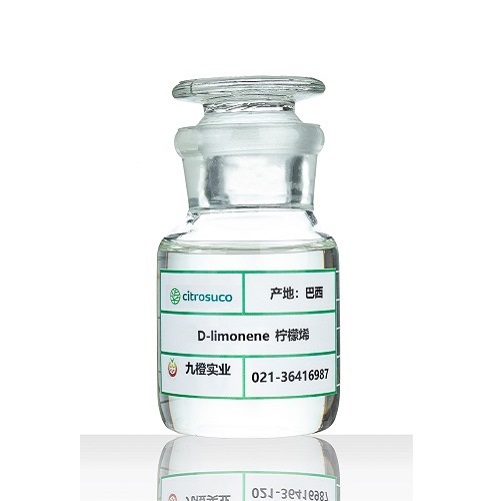

Brand: Citrosuco
Chinese Name: D-柠檬烯
English Name: D-limonene
CAS No.: 5989-27-5 、138-86-3、7705-14-8、 5989-54-8
Chemical name : d-1-methyl (1-methyl-vinyl) cyclohexane
The Characteristic of Brazilian Citrosuco D-limonene: aroma of citrus, slightly woody aroma, resin, fruity and typical aroma of limonene
Characteristics: Colorless clear liquid with typical orange aroma.
Solubility: insoluble in water but soluble in 95% alcohol.
Boiling Point/Range:175.5-178°C (347.9-352.4°F) at 763mm HG.
Melting Point/Range:-74 to -96.9°C
Flash Point: 45-49°C (113-121°F) ASTM D7094
Specific Gravity at 25°C: 0.840-0.850 g/ml
Package: 173kgs galvanized iron barrel, 1L; 5kg; 25L.
Preservation: Packaged products (closed top steel drums with inner coating) should be kept at 2°C~8°C in covered areas to avoid sunlight and oxidizing substance.
Specific applications in industrial preparation
Pure solvent substitution
D-limonene is currently preferred as a substitute for toxic solvent of mixed solvent formulations, such as alternative xylene, chlorinated solvents, ethylene glycol, methyl ethyl ketone, xylene, freon, fluorine chloride oxides, etc.
General cleaning Agent
Water based system cleaners with D-Limonene are very popular in Europe and America for they are economical and environment-friendly.
Cleaning agent for printing industry
Most suitable for cleaning the ink and colloid on the roller and the printing press.
Concrete cleaning Agent
It can be used to clear up the tar and asphalt of roadbed, bridges and the graffiti on the concrete by traffic sectors.
Stain cleaning Agent
Highly concentrated D-limonene is effective for ink, grease, paint, tar, bubble gum and bitumen. Eg. Adding enzymes to remove blood stains and adding acid of low concentrations to remove rust, coffee and tea stains.
Air cleaning agent: Remove carbon deposits or other substances from aeroengine.
Textile-dying: Used to produce textile auxiliaries for oil and grease removal.
Asbestos: Used in the removal of asbestos.
Electronic cleaning agent: Used in the cleaning of circuit board and electronic components.
Paint and coatings industry: being major raw material for the production of environment-friendly paints.
Steam inhalations : Can be added into steam inhalations.
Foam polypropylene: D-limonene can be used to recover foam polypropylene. It is a way of disposal of white pollution, characterized in the following steps are: (1) Dissolution: crush the wasted polystyrene foamed plastic and dissolve it with solvent to obtain mixture with polystyrene foamed plastic; The solvents including one or more of c10h16, turpentine, citrus oil, dimethyl carbonate or four vinyl chloride, it is a mixture of any proportion of the other solvents; (2) A solution containing polystyrene foamed plastic is collected from the mixtures obtained from step (1); (3) The solution collected by the Step (2) is to be processed by reduced-pressure distillation. Domestic Chemical industry: Especially in the spice industry, d-limonene can be directly used as a flavoring agent or the basic raw material to synthesize other flavors, as well as household cleaning care products (hand sanitizer, floor cleaner, carpet decontamination agent, kitchen oil removal agent, aromatic agent, etc.).
Food industry: As a fragrance agent, d-limonene has been applied in the food industry for a long time.
Chemical Industry: Used for Synthesis of terpene resin, paint and coatings, etc.
Pharmaceutical industry: It has special effects on dissolving the calculi in the human body. In 1974, an experiment was carried out to validate the effects of various drugs on the dissolution of the stone, finding that d-limonene is more effective on dissolving Cholesterol stones than sodium cholate, deoxycholic acid and chenodeoxycholic acid, having same effects with chloroform and ether.
Textile industry: Textile auxiliaries using d-limonene as raw material have the effect of removing oil and grease on cotton fabrics and wool.
Agricultural industry
Insecticide D-limonene Auxiliaries for family health are mainly extracted from orange peel and lemon peel. It can be made into Citrus Terpenes (D-limonene) insecticides with biological effects, whose effective ingredients are D-limonene 10%~15% (weight), and pyrethroid 1%~4% (weight). The rest ingredients are emulsifier 25%~32% (weight), solvent 43%~64% (weight). Finished products are colorless/colored clear liquid with orange flavor, which are extracted from orange peel. Being biodegradable, it is a kind of environmental friendly degreasing solvent with natural bactericidal effect, having been internationally recognized as food flavor additive and used in medicine simultaneously. It has the property of rapid evaporation and penetrability. The insecticide has killing effect on the agricultural pests such as lepidoptera, coleoptera, hemiptera and hymenoptera on various crops, which greatly reduce the use of organic phosphorus and chemical pesticides in agricultural production. Compared with conventional chemical pesticides, the insecticide has the characteristics of low toxicity and less residuals, also it takes effect more quickly than domestic bio-pesticide and can be comparable with chemical pesticide. Being a new innovation in the history of agricultural development, it is of great significance to protect ecology and human health.